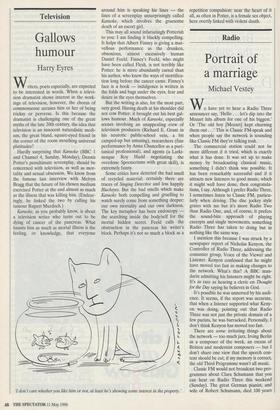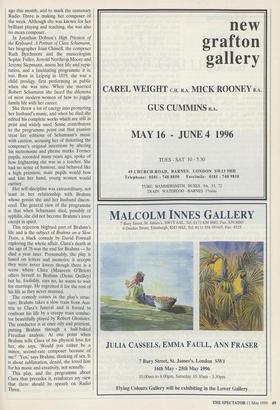Radio
Portrait of a marriage
Michael Vestey
We have yet to hear a Radio Three announcer say, 'Hello . . . let's dip into the Mozart hits album for one of his biggest.' Or 'The old boy [Mozart] kept churning them out .. .' This is Classic FM-speak and when people say the network is sounding like Classic FM they're talking tosh.
The commercial station could not be more different if it tried, which is exactly what it has done. It was set up to make money by broadcasting classical music, something I didn't think was possible. It has been, remarkably successful and if it attracts new listeners to good music, which it might well have done, then congratula- tions, I say. Although I prefer Radio Three, I sometimes listen to Classic FM, particu- larly when driving. The disc jockey style grates with me but it's more Radio Two than Radio One, and, of course, it prefers the sound-bite approach of playing excerpts and single movements, something Radio Three has taken to doing but in nothing like the same way.
I mention this because I was struck by a newspaper report of Nicholas Kenyon, the Controller of Radio Three, addressing the consumer group, Voice of the Viewer and Listener. Kenyon confessed that he might have moved too fast in making changes to the network. What's this? A BBC man- darin admitting his listeners might be right. It's as rare as hearing a cleric on Thought for the Day saying he believes in God.
It's possible he was unnerved by his audi- ence. It seems, if the report was accurate, that when a listener supported what Keny- on was doing, pointing out that Radio Three was not just the private domain of a few purists, he was barracked. Personally, I don't think Kenyon has moved too fast.
There are some irritating things about the network — too much jazz, Irving Berlin as a composer of the week, an excess of Britten and modernist composers — but I don't share one view that the speech con- tent should be cut; if my memory is correct, the old Third Programme wasn't all music.
Classic FM would not broadcast two pro- grammes about Clara Schumann that you can hear on Radio Three this weekend (Sunday). The great German pianist, and wife of Robert Schumann, died 100 years ago this month, and to mark the centenary Radio Three is making her composer of the week. Although she was known for her brilliant playing and teaching, she was also no mean composer.
In Jonathan Dobson's High Priestess of the Keyboard: A Portrait of Clara Schumann, her biographer Joan Chissell, the composer Ruth Byrchmore and the musicologists Sophie Fuller, Jerrold Northrop Moore and Jeremy Siepmann, assess her life and repu- tation, and a fascinating programme it is, too. Born in Leipzig in 1819, she was a child prodigy, first performing in public when she was nine. When she married Robert Schumann she faced the dilemma of most modern women of how to juggle family life with her career.
She threw a lot of energy into promoting her husband's music, and when he died she edited his complete works which are still in print and widely used. Some contributors to the programme point out that pianists treat her editions of Schumann's music with caution, accusing her of distorting the composer's original intentions by altering his metronome and phrase marks. Former pupils, recorded many years ago, spoke of how frightening she was as a teacher. She had no sense of humour, and behaved like a high priestess; male pupils would bow and kiss her hand, young women would curtsey.
Her self-discipline was extraordinary, not least in her relationship with Brahms whose genius she and her husband discov- ered. The general view of the programme is that when Schumann died, possibly of syphilis, she did not become Brahms's lover except in spirit.
This rejection blighted part of Brahms's life and is the subject of Brahms on a Slow Train, a black comedy by David Pownall exploring the whole affair. Clara's death at the age of 76 was the end for Brahms — he died a year later. Presumably, the play is based on letters and memoirs; it accepts they were never lovers though there is a scene where Clara (Maureen O'Brien) offers herself to Brahms (Denis Quilley) but he, foolishly, says no, he wants to wait for marriage. He regretted it for the rest of his life as they never married.
The comedy comes in the play's struc- ture: Brahms takes a slow train from Aus- tria to Clara's funeral and is forced to confront his life by a creepy train conduc- tor beautifully played by Robert Glenister. The conductor is at once oily and prurient, putting Brahms through a half-baked Freudian analysis. At one point when Brahms tells Clara of his physical love for her, she says, 'Would you rather be a minor, second-rate composer because of me?' Yes,' says Brahms, thinking of sex. It is about sublimation, denial, she loved him for his music and creativity, not sexually.
This play, and the programme about Clara that precedes it, reinforces my view that there should be • speech on Radio Three.



































































 Previous page
Previous page